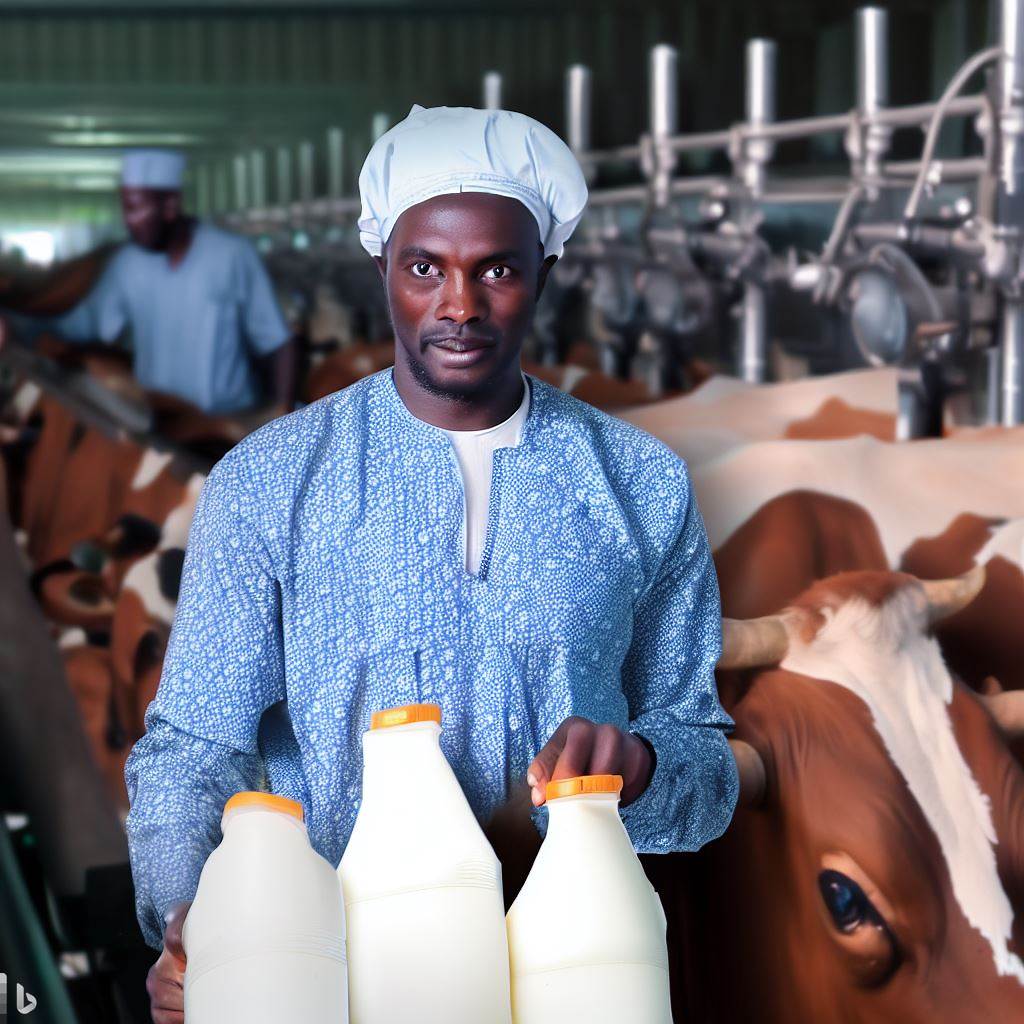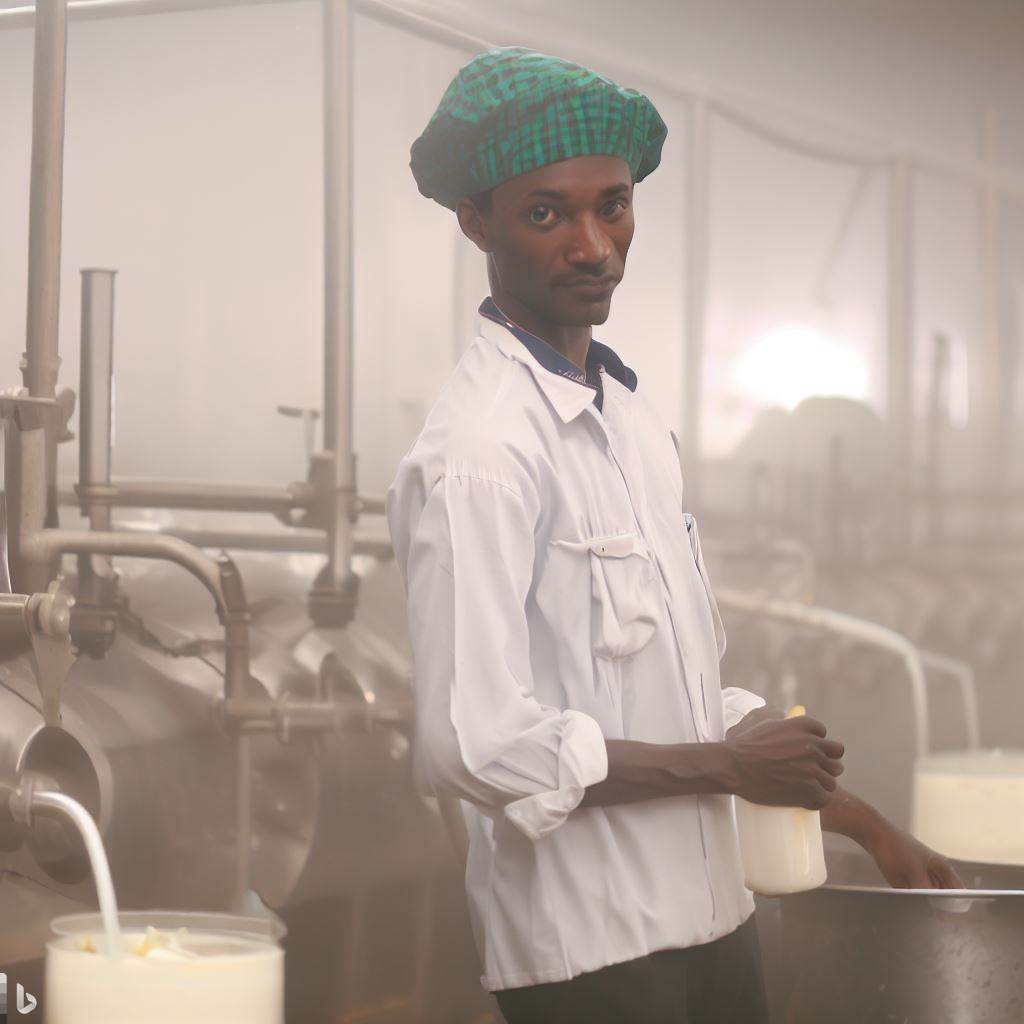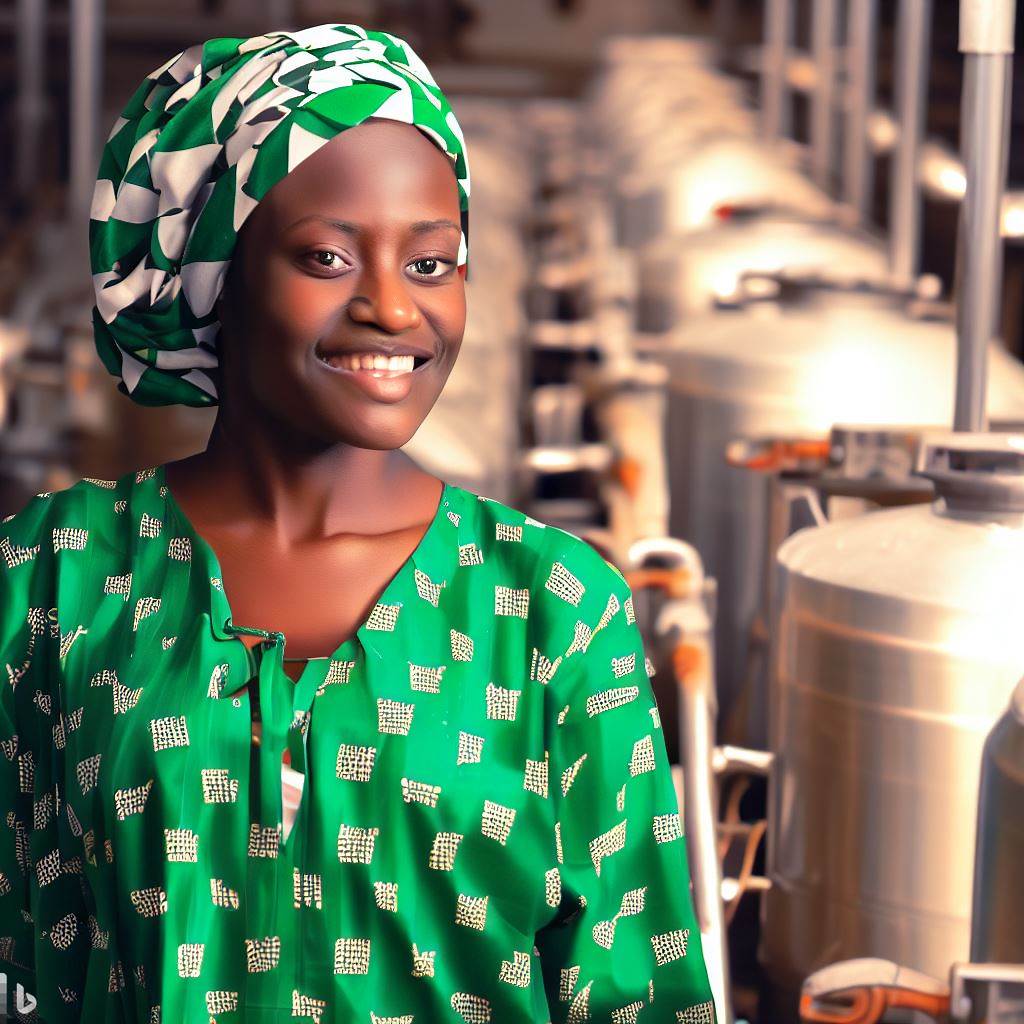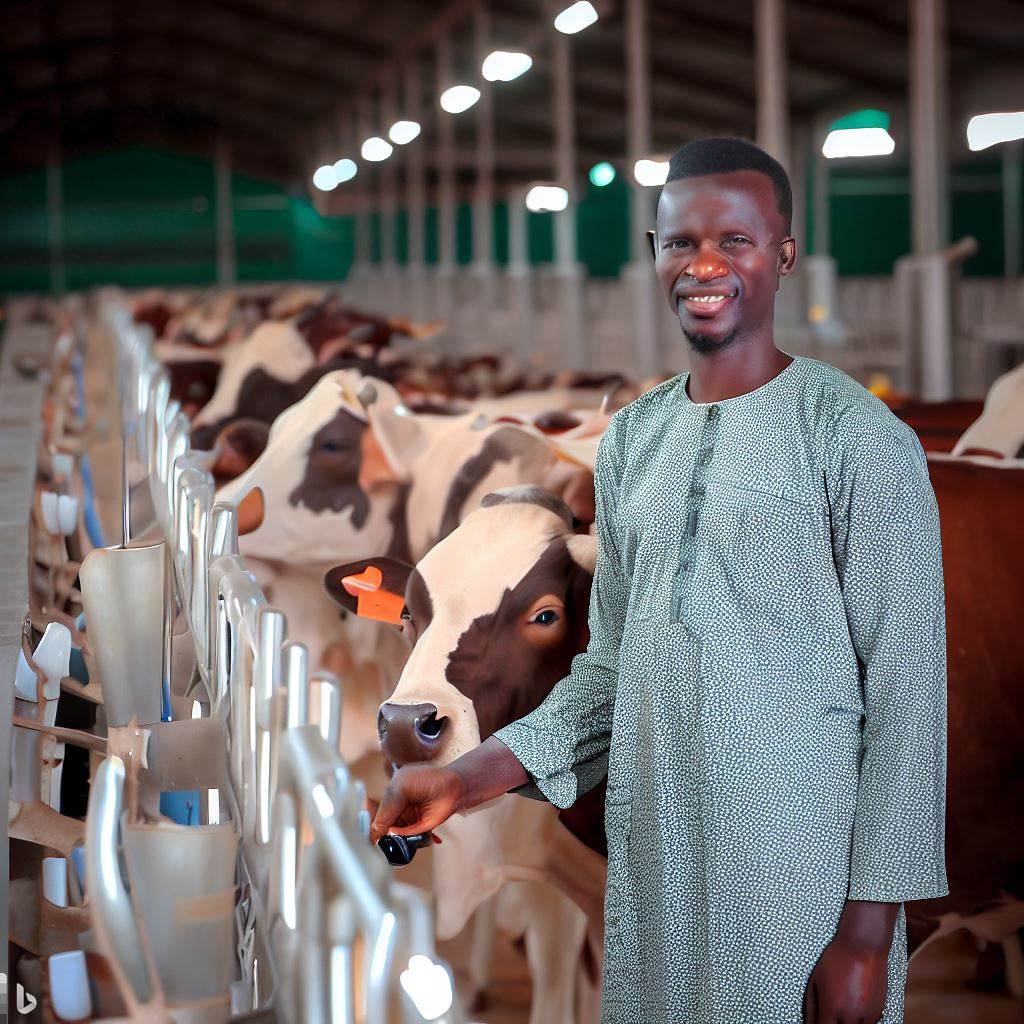Introduction
A. Dairy and Livestock in Nigeria: Crucial for Food Security, Economy, and Culture
Dairy and livestock production significantly shape Nigeria’s food security, rural livelihoods, and cultural practices.
These sectors contribute to protein-rich diets, generate employment, and preserve traditions.
B. Purpose of This Blog Post: Exploring the Path Forward
In this blog post, we delve into the evolving landscape of dairy and livestock production in Nigeria.
We examine challenges, innovations, and sustainable practices that can ensure a thriving future for these vital industries.
Through insightful analysis and examples, we aim to shed light on potential strategies for enhanced productivity, economic growth, and cultural continuity.
Current Challenges in Dairy and Livestock Production in Nigeria
Dairy and livestock production in Nigeria faces numerous challenges that hinder its growth and development.
These challenges range from a lack of modern infrastructure and technology to insufficient knowledge and training among farmers, as well as poor breed quality and genetics.
A. Lack of modern infrastructure and technology
The absence of modern infrastructure and technology stands as a prominent hurdle.
Farmers struggle with inadequate access to crucial veterinary services, hampering effective health management for their livestock.
Furthermore, the scarcity of essential milking machinery and equipment limits their capacity to achieve efficient and substantial milk production.
B. Insufficient knowledge and training among farmers
Another obstacle is the insufficient knowledge and training among farmers. Many farmers are not aware of the best farming practices or lack access to educational resources that could enhance their skills.
This leads to suboptimal production methods and overall lower yields. Without proper training, farmers are unable to effectively manage their livestock and maximize their potential.
C. Poor breed quality and genetics
The poor breed quality and genetics of Nigerian cattle pose a significant challenge. The low productivity and milk yield of indigenous breeds affect the profitability and sustainability of dairy farming.
These breeds are also more susceptible to diseases and infections, leading to higher mortality rates and increased production costs.
Improvements in breed quality and genetics are necessary to boost production and ensure the long-term viability of the industry.
To overcome these challenges, several steps can be taken. Firstly, there is a need for investment in modern infrastructure and technology.
This includes improving access to veterinary services and providing farmers with milking machines and equipment that can enhance productivity.
Furthermore, efforts should be made to increase farmers’ knowledge and training.
Awareness campaigns on best farming practices and the availability of educational resources can help farmers improve their skills and increase their productivity.
Government and non-governmental organizations can play a crucial role in providing training programs and creating platforms for knowledge sharing among farmers.
Lastly, addressing the issue of breed quality and genetics is crucial. There should be initiatives to promote the breeding of high-yielding and disease-resistant livestock.
This can be achieved through selective breeding programs and the introduction of improved breeds.
Collaboration between research institutions, breeders, and farmers is vital to identify suitable breeds and ensure their availability to farmers.
In fact, the future of dairy and livestock production in Nigeria relies on addressing the current challenges.
By investing in modern infrastructure and technology, improving farmers’ knowledge and training, and enhancing breed quality and genetics, the industry can overcome these obstacles and achieve sustainable growth and development.
Read: The Future of Animal Genetics in Nigeria
Potential Solutions and Innovations
The future of dairy and livestock production in Nigeria presents various challenges that need to be addressed.
However, there are potential solutions and innovations that can help steer the industry towards growth and improved efficiency.
A. Enhancing infrastructure and technology
One key aspect of improving dairy and livestock production in Nigeria is enhancing infrastructure and technology.
This involves improving veterinary services and accessibility, ensuring that farmers have better access to veterinary care and expertise.
Additionally, promoting the use of milking machines and modern equipment can significantly improve productivity and efficiency in the industry.
B. Strengthening education and training programs
Another crucial step towards the future of dairy and livestock production in Nigeria is strengthening education and training programs.
Increasing farmers’ awareness of best practices through training programs and workshops can help them adopt more efficient farming methods.
Providing farmers with the necessary resources and skill development opportunities can also contribute to improved productivity in the industry.
C. Developing breeding programs and genetic improvement
Breeding programs and genetic improvement play a vital role in shaping the future of dairy and livestock production in Nigeria.
Importing superior breeds and genetics can help enhance the quality and productivity of Nigerian livestock.
Additionally, establishing breeding centers and programs can contribute to the development of indigenous breeds that are well-suited to the local environment.
In essence, addressing the challenges faced by the dairy and livestock production industry in Nigeria requires a multi-faceted approach.
Enhancing infrastructure and technology, strengthening education and training programs, and developing breeding programs are all potential solutions and innovations that can drive the industry towards growth and improvement.
By implementing these strategies, Nigeria can unlock the full potential of its dairy and livestock sector and ensure a prosperous future for the nation’s farmers and consumers alike.
Read: Animal Geneticist: Nigeria’s Answer to Food Security?
Learn More: The Power of Poultry: Boosting Nigeria’s Food Security
Government Support and Policy Reforms
Government support and policy reforms play a significant role in shaping the future of dairy and livestock production in Nigeria.
By providing economic incentives, such as subsidies and financial support, the government can encourage farmers to invest in these sectors.
This can lead to increased production, job creation, and economic growth.
A. Economic incentives for farmers
Subsidies and financial support are essential to help farmers overcome the high costs associated with dairy and livestock production.
Providing subsidies for inputs such as animal feed, veterinary services, and equipment can make these essential resources more affordable for farmers.
Financial assistance can also help cover operational costs and promote sustainable farming practices.
Tax breaks for industry-related investments can encourage both domestic and foreign investors to allocate funds towards dairy and livestock production.
These investments can contribute to the modernization of the sector, improve productivity, and enhance product quality.
Tax incentives can help attract new players and stimulate competition, ultimately benefiting consumers through better prices and choices.
B. Research and development funding
Research and development (R&D) funding is crucial to foster innovation and address challenges specific to dairy and livestock production.
Collaboration with academic institutions can facilitate research projects and the development of new technologies.
By allocating funds to support innovative projects, the government can promote new farming techniques, breeding methods, and disease control measures.
This can lead to higher productivity, improved animal health, and increased profitability for farmers.
C. Regulatory reforms to improve the sector
Regulatory reforms are necessary to ensure the growth and sustainability of the sector. Streamlining licensing and certification procedures can reduce bureaucratic hurdles, saving farmers time and resources.
By simplifying the process, more farmers can enter the market, increasing competition and supply.
Reinforcing animal welfare and food safety standards is essential to protect consumers and build trust in Nigerian dairy and livestock products.
The government should ensure proper enforcement of regulations and establish monitoring systems to guarantee compliance.
Overall, government support and policy reforms are pivotal in shaping the future of dairy and livestock production in Nigeria.
Economic incentives, research funding, and regulatory reforms can encourage investment, innovation, and sustainability in the sector.
By working collaboratively with farmers, academic institutions, and industry stakeholders, the government can build a robust and prosperous dairy and livestock industry for Nigeria’s future.
Read: A Day in the Life of a Nigerian Animal Geneticist
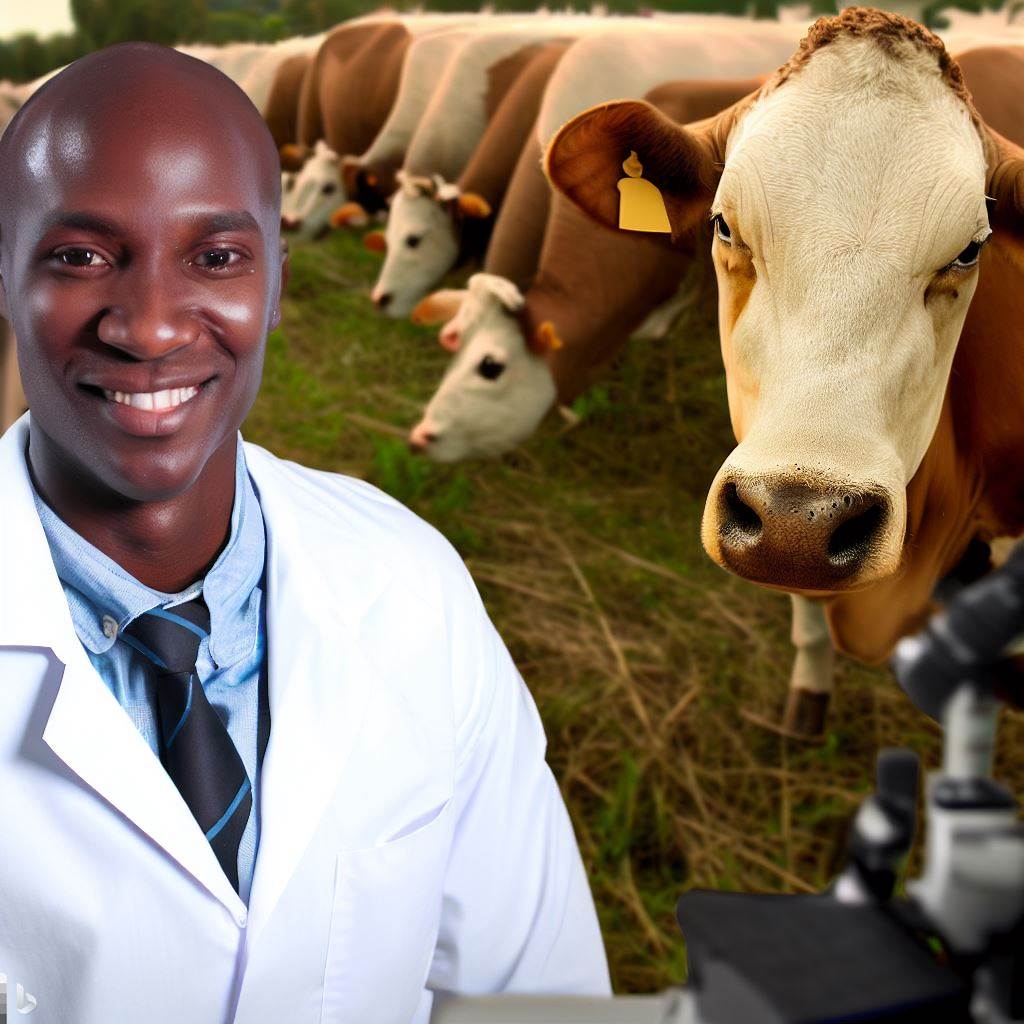
Socioeconomic and Environmental Impact
A. Contribution to rural development and employment
Dairy and livestock production in Nigeria has the potential to significantly contribute to rural development. By creating employment opportunities, it can improve the socioeconomic conditions of rural communities.
Increased production, processing, and marketing of dairy products can generate income for small-scale farmers.
Training programs and access to modern farming techniques can further enhance their productivity and economic prospects.
Overall, the dairy and livestock sector can play a vital role in reducing rural poverty and improving livelihoods.
B. Enhancing food security and nutrition
Dairy and livestock production can contribute to ensuring food security in Nigeria. The consumption of dairy products provides essential nutrients such as proteins, vitamins, and minerals.
By improving animal genetics and nutrition programs, the quality and quantity of dairy products can be enhanced.
Increased availability and access to locally sourced dairy products can improve the nutritional status of the population.
Furthermore, the diversification of food sources through dairy production can help mitigate food insecurity risks.
C. Reducing dependence on imported dairy products
Nigeria currently relies heavily on imported dairy products to meet its domestic demand. Investing in dairy and livestock production can help reduce this dependence on imports.
By promoting local production, Nigeria can save foreign exchange and improve its trade balance.
The development of a self-sufficient dairy industry can lead to increased competitiveness and reduced importation costs. It will also provide consumers with access to affordable and quality dairy products.
D. Implications for sustainable agriculture and environmental conservation
Investing in dairy and livestock production should be carried out with a focus on sustainability.
Efforts should be made to minimize the environmental impact through proper waste management and sustainable farming practices.
Adoption of technologies such as biogas production from animal waste can reduce greenhouse gas emissions.
Proper land and water management strategies should be employed to mitigate the potential negative effects of intensive livestock farming.
Overall, ensuring the sustainability of dairy and livestock production will contribute to environmental conservation in Nigeria.
In general, the future of dairy and livestock production in Nigeria holds great promise in terms of socioeconomic development, food security, reduced import dependence, and environmental conservation.
By investing in the sector and implementing sustainable practices, Nigeria can unlock the potential of its dairy industry to benefit rural communities, improve nutrition, and contribute to its economic growth.
Read: Role of Animal Geneticist in Nigeria’s Agro-economy
Conclusion
This blog post discussed the future of dairy and livestock production in Nigeria.
We highlighted the key points, which include the challenges faced by the industry, such as low productivity and outdated farming practices.
However, we also emphasized the potential and importance of improving dairy and livestock production in Nigeria.
By adopting modern farming techniques, investing in research and development, and providing support to farmers, Nigeria can increase its dairy and livestock production.
This will not only enhance food security but also create employment opportunities and contribute to economic growth.
Publish Your Professional Profile, Business or Brand
Showcase your expertise, gain trust, and boost visibility instantly on Professions.ng.
Publish NowTherefore, it is crucial for the government, private sector, and stakeholders to collaborate and work towards developing and expanding the dairy and livestock sector.
With the right strategies and investments, Nigeria has the potential to become a leading player in dairy and livestock production in Africa.
By doing so, the country can meet its domestic demand for dairy products and reduce its dependence on imports.
Improving dairy and livestock production in Nigeria is vital for the country’s future food security and economic development.
It is an opportunity that should be seized, and it requires collective efforts from all stakeholders involved.

